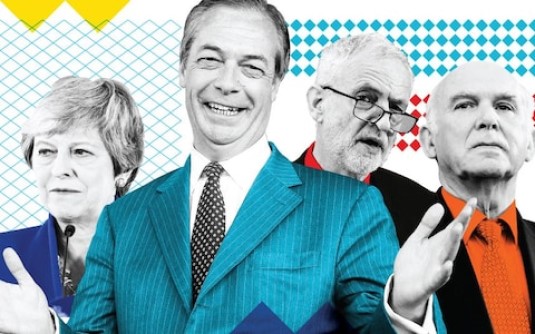
For the Tories, we know exactly how Theresa May got the Tories in this mess in the first place. 8.8% of the vote, their worst result in a national election ever, and by quite some distance. They went from 19 MEPs to just four.
And Labour? Oh Labour, Labour, Labour. Of course, seeing the party vote melt away in London and everywhere of significance was pretty grim. Even saying see ya to Gerard Batten, and the pathetic result for Yaxley-Lennon was scant consolation. But as night follows day, the calls have grown attacking Labour's Brexit position as confusing (it's not confusing, it just doesn't lend itself to a polarised election contest), and for it to go full on remain. We'll talk about that in another post, but it is worth noting that outside of London it was the Brexit Party who appeared to benefit most from our misfortunes, and so simply switching our position is not without consequence.
You can understand the panic all over the place, but there are two main things that have to be remembered. As with the local election results, EU elections don't matter as far as most people are concerned. This has two consequences: most stay at home (hence the turn out), and those who don't are more likely to protest. For instance, the story pushed by Lady Jess of loyal Brummie Labour activists voting LibDem on the quiet (that they didn't secretly punt for the Greens says a great deal about how awful their politics are) might be true, but would they have done so during a general election? Unlikely.
The second observation is older people are more likely to turn out in elections, and this is especially magnified when it comes to second order elections. Why is this relevant? Because, as we know, there are big differences between older and younger voters. The older you are, particularly if you are retired, the more likely you are to vote for the right for a number of reasons. This suggests the Brexit Party vote, on 31%, is inflated in the sense it could never get that were turnout increased. Therefore, for those holding out a hope for Labour doing well on a second referendum ticket, a general election is going to turn out more of, for want of a better phrase, its kind of people. And there is also this piece from the LSE making the case of interpreting the results as a swing away from Leave to Remain, suggesting there is a bigger pool for Labour to fish from than the shrinking pond available for the Tories.
The final thing worth recalling are those Westminster polls which, despite being overwritten by EU election concerns, give us different numbers to Sunday night's cluster mess. It isn't just that people care more because government has a greater impact on people's lives (and yes, even more than Brexit), but because the political economy that gave us 2017's polarised vote is still there. And that's not going away, no matter the contortions and spin put on Sunday's vote.
5 comments:
https://www.theguardian.com/politics/2019/may/27/jeremy-corbyn-signals-more-support-for-second-referendum-after-voter-exodus
Slowly, slowly the superman halo is slipping…
Thank you Phil for this terse recitation of all the factors that our detractors are deliberately misrepresenting to present as fact their fantasy that Labour is also imploding, not least because Corbyn and his restoration of Labour's democratic socialisism, is, in itself, unnatural and bad for Labour.
Alan Story, the imagined 'superman halo' you ascribe to Jeremy Corbyn is actually a simple restoration of Labour values. Nothing more, nothing less. Sure it is necessary and contingent upon the Corbyn project, but will one day soon be completely independent of him. He was merely its enabler and is today its representative, but "super hero", no merely its capacitator.
A superbly incisive analysis Phil.
I'm just amazed that you, Phil, can say Labour's position on Brexit *isn't* "confusing: me and all my Labour colleagues out on the knocker last week thought it was "confusing". And so did most of the ordinary folk we spoke to.
Labour's failure to provide a clear, cohesive and sensible message on Brexit is a big deal. You might feel there is one being more intimately connected to the party, but I and millions of others aren't feeling it at all. A party offering some sort of nebulous fudge and arguments that often seemed to equate to "Please vote for us or it might embarrass Corbyn and weaken the Corbynite reformation" doesn't cut it.
Much of this I feel represents wider Corbyn issues. I might like the idea of lefter-leaning policies to restrain ever-increasing neoliberalism, but on a lot of issues he doesn't seem to be visible, active, or effective. If Labour wants to sit on its hands for while and complete a rework of the party rather than provide voters something tangible to understand and grasp, it can't complain if it doesn't get votes.
Phil,
I'm surprised we haven't had your considered analysis of the Euro Elections yet. Perhaps you could include in it the fact that the latest polls for Westminster elections give a clear lead to the Liberals that Corbyn's crazy politics have resurrected from the grave, whilst putting Labour in joint fourth with the Tories, only marginally ahead of the Greens.
Is this as Corbyn's Stalinist advisors say only a blip, or to parapphrase Monty Python's Black Night "'Tis but a scratch"?
Post a Comment